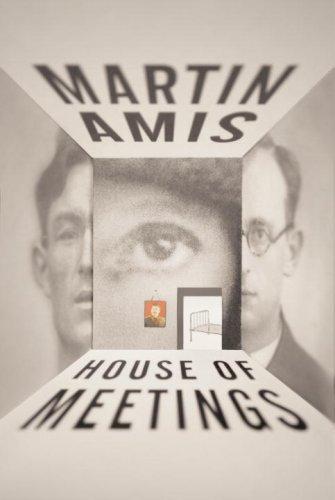
House of Meetings
کتاب های مرتبط
- اطلاعات
- نقد و بررسی
- دیدگاه کاربران
نقد و بررسی

November 6, 2006
A unnamed former gulag inmate in Amis's disappointing latest is now a rich, 84-year-old expatriate Russian taking a tour of the former gulags in 2004. The narrator chronicles his current and past experiences in a book-length letter to his American "stepdaughter," Venus. Wry remarks on contemporary Russia and the U.S. run up against gulag reminiscences, which tell of the years 1948 through 1956, when the narrator and his brother Lev suffered in the Norlag concentration camp. The letter contains another letter, from the dying Lev, dated 1982, which was the year Lev's son Artem died in Afghanistan. Lev's first wife—and the narrator's first love—was Zoya, a Jewish Russian beauty who by 1982 was an alcoholic married to a Soviet apparatchik. The narrator's own feeling of debasement, when, after Lev's death, he finally meets Zoya again in Norlag's conjugal cabin (the House of Meetings), is complicated to the point of impaction. Amis's trademark riffs are all too muffled in his obvious research. And Venus, the narrator's supposedly beloved stepdaughter, is such a negative space filled with trite clichés about affluent young Americans, and such irritating second guesses about her reactions, that it lends a distinctly bullying tone to the book.

December 1, 2006
The title of this latest from best-selling novelist Amis ("Night Train") refers to a cabin in a Siberian slave-labor camp where, during the Stalin years, some of the state's prisoners could have conjugal visits. The text takes the form of a memoir written by an elderly and now prosperous camp survivor to his American stepdaughter, Venus, whose pampered and sheltered life stands in stark contrast to the appalling atrocities the old Russian has seen and sometimes participated in during the war and after. He scoffs at her idea of closure, saying that nobody ever gets over anything. Described as the story of a love trianglethe narrator and his brother, Lev, are both in love with a bold Jewish girl named ZoyaAmis's novel is more a parable about the crushing evils visited on the Russian people throughout the 20th century and still continuing today. Although Amis writes as brilliantly as ever, squeamish readers may find the graphic scenes of life in the gulag difficult to get through. Recommended. [See Prepub Alert, "LJ" 9/1/06.]Leslie Patterson, Brown Univ. Lib., Providence
Copyright 2006 Library Journal, LLC Used with permission.

Starred review from November 15, 2006
Amis has said that he's never been to Russia, but you'd never know that by reading " House of Meetings," which stares into that country's soul deeply enough to convince anyone who's ever read its novels, at least. The narrator, an elderly man given to fits of rage and outbursts of generosity, is returning as a tourist to the work camp above the Arctic Circle where he was once a prisoner in Stalin's Gulag. As he travels, he writes his memoir for an audience of one, reconstructing the love triangle that includes himself, his brother, Lev, and his brother's wife, Zoya. (The House of Meetings is a building where Lev, also a prisoner, is allowed a single conjugal visit with Zoya.) The grim story builds with a Dostoyevskian sense of doom and a Nabokovian dark wit. But, for a Russian novel, this one is exceedingly economical, encompassing in its brevity an exploration of Russian history and character, political intolerance and anti-Semitism, the psychology of incarcerated life and the problems of freedom, and the weight of crime on the conscience. The narrator is a man who's done terrible things and is able to look at them philosophically--a perfect character for a fearless writer like Amis. His prognosis for Russia is grim, but fans of the writer will be gratified by this remarkable return to form.(Reprinted with permission of Booklist, copyright 2006, American Library Association.)

























دیدگاه کاربران